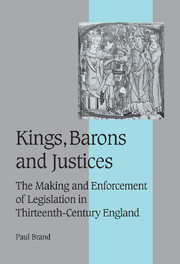Book contents
- Frontmatter
- Contents
- List of tables
- Preface
- List of abbreviations
- INTRODUCTION
- Part I Politics and the legislative reform of the common law: from the Provisions of Westminster of 1259 to the Statute of Marlborough of 1267
- Part II Beyond politics: the enforcement and interpretation of the Statute of Marlborough in the courts, 1267–1307
- Chapter 8 CONTRA FORMAM FEOFFAMENTI: THE STATUTORY ACTION FOR TENANTS CONTESTING LIABILITY TO SUIT OF COURT AFTER 1267
- Chapter 9 OTHER MECHANISMS FOR THE ENFORCEMENT OF CHAPTER 9; OTHER REFORMS AFFECTING THE LORD–TENANT RELATIONSHIP
- Chapter 10 REFORMS IN THE CRIMINAL JUSTICE SYSTEM
- Chapter 11 REFORMS IN THE PROCEDURES OF THE ROYAL COURTS
- Chapter 12 THE EXTENSION OF EXISTING REMEDIES
- Chapter 13 ENFORCING THE ACCOUNTABILITY OF SOCAGE GUARDIANS
- Chapter 14 CONTROLLING THE USE OF DISTRAINT
- Chapter 15 REMEDYING ABUSES IN THE OPERATION OF LOCAL COURTS
- Chapter 16 CONCLUSIONS
- Appendix I TEXT AND TRANSLATION OF THE PROVISIONS OF WESTMINSTER OF 1259
- Appendix II TEXT AND TRANSLATION OF THE PROVISIONS OF WESTMINSTER AS REISSUED IN 1263 AND 1264
- Appendix III TEXT AND TRANSLATION OF THE STATUTE OF MARLBOROUGH OF 1267
- Bibliography
- Index
- Cambridge Studies in Medieval Life and Thought Fourth series
Chapter 11 - REFORMS IN THE PROCEDURES OF THE ROYAL COURTS
Published online by Cambridge University Press: 16 June 2009
- Frontmatter
- Contents
- List of tables
- Preface
- List of abbreviations
- INTRODUCTION
- Part I Politics and the legislative reform of the common law: from the Provisions of Westminster of 1259 to the Statute of Marlborough of 1267
- Part II Beyond politics: the enforcement and interpretation of the Statute of Marlborough in the courts, 1267–1307
- Chapter 8 CONTRA FORMAM FEOFFAMENTI: THE STATUTORY ACTION FOR TENANTS CONTESTING LIABILITY TO SUIT OF COURT AFTER 1267
- Chapter 9 OTHER MECHANISMS FOR THE ENFORCEMENT OF CHAPTER 9; OTHER REFORMS AFFECTING THE LORD–TENANT RELATIONSHIP
- Chapter 10 REFORMS IN THE CRIMINAL JUSTICE SYSTEM
- Chapter 11 REFORMS IN THE PROCEDURES OF THE ROYAL COURTS
- Chapter 12 THE EXTENSION OF EXISTING REMEDIES
- Chapter 13 ENFORCING THE ACCOUNTABILITY OF SOCAGE GUARDIANS
- Chapter 14 CONTROLLING THE USE OF DISTRAINT
- Chapter 15 REMEDYING ABUSES IN THE OPERATION OF LOCAL COURTS
- Chapter 16 CONCLUSIONS
- Appendix I TEXT AND TRANSLATION OF THE PROVISIONS OF WESTMINSTER OF 1259
- Appendix II TEXT AND TRANSLATION OF THE PROVISIONS OF WESTMINSTER AS REISSUED IN 1263 AND 1264
- Appendix III TEXT AND TRANSLATION OF THE STATUTE OF MARLBOROUGH OF 1267
- Bibliography
- Index
- Cambridge Studies in Medieval Life and Thought Fourth series
Summary
Various changes had been made by the Provisions of Westminster and by the Statute of Marlborough in the procedures, and especially in the mesne process, used in the royal courts. These had mainly been made in an effort to make the central royal courts more efficient and to afford absent defendants less opportunity for delay. Shorter adjournments than normal were authorised in certain types of litigation; mesne process was abbreviated in certain types of case; the initial process was made harsher under certain circumstances in the action of account. There were also a number of other minor changes which were intended to eliminate what had been perceived as abuses in the operation of royal courts. This chapter will examine how these various changes worked in practice during the four decades between the enactment of the Statute of Marlborough and the end of the reign of Edward I.
ADJOURNMENTS IN ACTIONS OF DOWER
As has been seen, clause 6 of the Provisions of Westminster was among the clauses significantly amended when the Provision were reissued in 1263 and it was in this amended form that it was further reissued in 1267 as part of chapter 12 of the Statute of Marlborough.
- Type
- Chapter
- Information
- Kings, Barons and JusticesThe Making and Enforcement of Legislation in Thirteenth-Century England, pp. 302 - 335Publisher: Cambridge University PressPrint publication year: 2003



